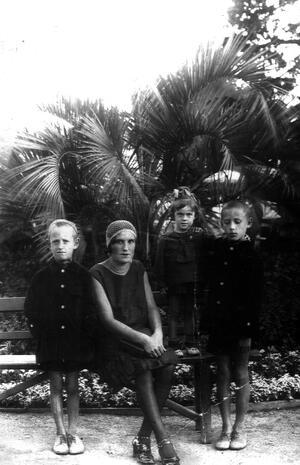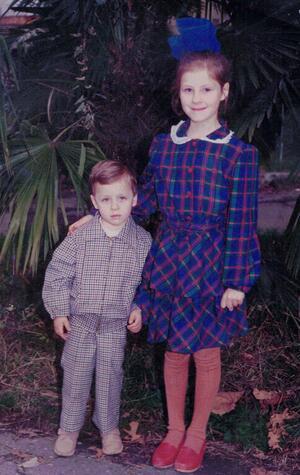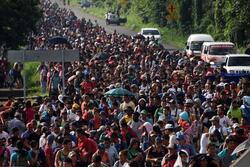A Refugee Tale
These days when people ask me where I’m from, I tend to respond with the state I lived in most recently. I have been from South Carolina, from Florida, from Georgia, from Pennsylvania, and now from New Jersey. If they press further, I say Ukraine. I don’t elaborate. I have told myself that these strangers, whose microaggressions have plagued me for years, do not deserve my life story. And it is usually strangers who demand it, who scrutinize my accent, singling me out as someone who does not belong in the only country that has granted me citizenship. I am an American, and I am a refugee.
My immigration narrative begins in 1985, when at the age of two I moved from Kharkov, Ukraine to Abkhazia. My parents were graduating from medical school, and my dad was starting his mandatory military service at a base outside of Moscow. I was sent down south to live with my grandparents in Sukhumi, the capital of Abkhazia. My mother’s family had relocated to the region on the eve of World War II as Ukraine was becoming less hospitable to its Jewish population.
In 1992, shortly after the dissolution of the Soviet Union, a series of revolutions swept across the Caucasus region. The sense of ‘this won’t happen here’ was shattered one summer afternoon when we watched in disbelief as tanks and arms carriers moved into Sukhumi. I was nine years old. My mom was determined to get the children to safety back in Kharkov, where my father was continuing his education while living with his mother. My grandparents outright refused to leave. They were convinced that all this fighting would blow over. As Jews living in the region, they had no say in the geopolitical conflict between Georgia and Abkhazia.
Our first evacuation attempt was a disaster. Georgian troops had opened fire at a crowded pier, and the Russian ships were forced to turn around, leaving hundreds of civilians behind, us included. Our second attempt was less harrowing. My mom had managed to secure seats for us on an overcrowded flight to Moscow, and from there, we took a train to Kharkov, Ukraine.
The three years we spent in Kharkov taught me what it means to be unwanted. The country where I was born, where generations of my family had lived prior to relocating to the Caucasus region on the eve of WWII, did not want us. Our applications for naturalization were denied repeatedly. Because we were not Ukrainian—our nationality is listed as Jewish as per Eastern European policy—and because we were not present in Ukraine when it became an independent state, we were not eligible for citizenship. We moved from one apartment to another while my parents worked two and sometimes three jobs to make ends meet. Teachers and students alike made fun of my “Georgian” accent. I had never identified as Georgian before. When my mom complained about this treatment, my grades suddenly and inexplicably dropped. My identity as a straight-A student was now stripped away as well.
With the help of the Hebrew Immigrant Aid Society (HIAS), an international organization that provides assistance to refugees, we were able to submit an application for the family reunification program, as my grandfather’s brother and his family had immigrated directly to the US from Abkhazia as refugees. We took a train back to Moscow, this time for an interview. In 1995, we received permission to enter the US.
When we arrived in New York, we went through yet another immigration screening. I remember an officer giving my grandmother a hard time because she looked “younger” than she did in her passport photo. She lost some weight and dyed her hair in anticipation of this new stage in our lives. Hours later we boarded yet another flight to South Carolina, where my parents still live. Sleep-deprived and exhausted, we landed in Charleston, where we were greeted by the Eastern European Jewish community, many of whom had very similar immigration experiences. I was twelve years old.
I probably don’t have to tell you that Charleston was not the most welcoming place for strangers. We sought out as many friends and allies as we could. A special-education teacher at my small Hebrew middle school did her best to help me learn American idioms while she simultaneously worked with a six-year-old on his lisp. We both learned how to pronounce “truck” without her cringing at our efforts. I didn’t say much my first year in the States. I listened. I read. I painted. I wrote bad poetry. I pretended I didn’t understand the kids who taunted me at school for wearing hand-me-downs. I became known as the Russian girl. Strangely enough, it took moving to the United States for me to gain that identity. I had never lived in Russia. I had no grounds for seeking Russian citizenship, and even if I had, I would never be Russian. In Russia, I would be a Jew. But no one cared about that particular conundrum. At school my basic questions were met with “Oh, you just don’t get it, honey, because you are not from around here.” I studied harder.
Throughout my high school experience, there was a fear of being sent back. While living in the US as a resident alien with a social security card and a green card, I was terrified that if I broke some rule or got into any kind of trouble, they would deport me. Living with that kind of fear was stifling. I became a US citizen in 2001, shortly after 9/11. My case was separated from the rest of the family when I turned eighteen, so I had to take the exam on my own. I did what I have always done: I studied. In the midst of fear and surging US nationalism, I studied with the hope that if I passed this one exam, no one could ever send me back again.
I have been a US citizen for almost two decades. That fear of being unwanted, of being forced to go back (but where to, exactly?), is creeping back as I watch with horror the way children are being torn away from their parents at the border. My heart is breaking as families who have gone through even worse ordeals than mine, who thought they had finally found safe harbor here in the United States, are being denied that promise. As I process the tragedy that occurred in Pittsburgh, a tragedy in which eleven members of the Tree of Life synagogue became victims of a domestic hate crime while attending Shabbat services, I am terrified of the kind of antisemitism that has bubbled up to the surface in the US. I am scared once again of what the future may hold.
My story is not unique. It is rather familiar to many refugees I have met throughout my twenty odd years living in the US. It is a story of perseverance in the face of adversity. It is about pulling yourself and your family out of a bad situation and seeking safe harbor on a strange shore. It is a story of relying on organizations like HIAS, who step in when governments do not. It is an American story.









Thank you for sharing a bit about yourself with your readers, we are so grateful for organizations such as HIAS and IRC. As more people take time to get to know and befriend people coming to US I hope our welcome is more genuine and inclusive and accepting.